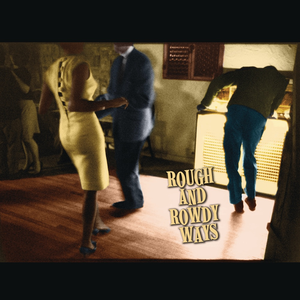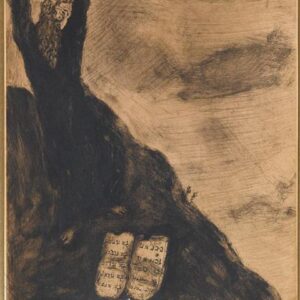I’ve been spending Covidtide cycling as much as possible. The mental rhythm of riding is calming, contemplative. Something gets in my head and I just keep turning it over. Since June 19th it’s been Bob Dylan’s new album, Rough and Rowdy Ways, released on that date. The album has given me a sense of the passing away of all things: a sense, to quote “Murder Most Foul” —the vast elegy and litany that closes Dylan’s new album—of the soul of the country torn away, and the whole thing going down in a slow decay.
But while zigzagging on dirt and gravel roads and passing through hamlets and subdivisions, among people going about the American summer some of them masked and some maskless, I have begun to think this may not be a depressing and morbid effect. I’ve begun to think of this feeling the music gives me as prophetic.
Certainly the prophetic encompasses that elegiac or tragic or decadent feeling for the judgment and doom of a great nation. Prophecy is the revelation of how the deep down things, the egregores and the spirit of the place, really are in a country. But is the word tossed around too casually in a post-religious world? The Hebrew prophets were serious, they meant business—but then so does Bob Dylan. He sings in the second song on the new album, “False Prophet”:
Hello Mary Lou, Hello Miss Pearl
My fleet-footed guides from the underworld
No stars in the sky shine brighter than you
You girls mean business and I do too
The refrain of the song insists that the singer is no false prophet—so does that make him a true prophet, or is he denying the prophet’s role altogether?
The root of the Hebrew word for prophet (navi in this context) shows that the prophet is one called by God to speak for God to a whole land, nation, people. The prophet speaks on the divine behalf, though he or she may intermix the lyric (personal) point of view, and when God speaks to humankind, it is for the purpose of turning the latter back to his Way.
Decrying injustice, employing elevated or visionary language, predicting the future and bemoaning decay—these qualities alone do not make the prophet. The prophet is one who, at least sometimes, speaks for the ultimate Other. And he or she knows it and rues—sometimes flees—the task.
That said, I still think Dylan’s late style is prophetic. On his 2009 album Together Through Life there’s a line that gets to the heart of the matter: “Some people, they tell me I’ve got the blood of the land in my voice.” Not blood-and-soil but the blood of the land. We’re talking here about a Jewish kid from the Minnesota backwoods. God tells Cain that his brother’s blood cries from the ground for justice. The tragedy of history, not millenarian ethnic and racialist nationalism, is what’s at stake in such language.
If the artist doesn’t quite claim the prophetic role, if he’s not speaking on behalf of God to the people and the land, then might he speak on behalf of the people and the land to the people and the land? The task is to somehow account for why the poetic voice of the album seems to be more than a persona (i.e. mask) and rather something that participates in a higher register of human being—perhaps one rung down Jacob’s Ladder from the fully fledged biblical prophet?
Geography is key, a point to which I’ll return, but that divine yet ironical, chastising tone is manifest on Dylan’s new album. In “Goodbye Jimmy Reed” he sings:
G-d be with you, brother dear
If you don’t mind me asking, what brings you here?
Oh, nothing much, I’m just looking for the man
I came to see where he’s lying in this lost land
(I took these lyrics from the official Bob Dylan website, and I note that the traditional Jewish piety of not writing the complete word God has been observed.)
Here is the condemning and threatening statement of the prophet, but made indirectly through dialogue; the main voice of the album is the one that asks the question. However, that voice, too, is capable of prophetic condemnation. The same song (a rollicking, aggressive blues riff in tribute to Jimmy Reed) begins by belting out a sarcastic dismissal of the ossified forms of American religion:
I live on a street named after a Saint
Women in the churches wear powder and paint
Where the Jews and the Catholics and the Muslims all pray
I can tell a Proddy from a mile away
Goodbye Jimmy Reed – Jimmy Reed indeed
Give me that old time religion, it’s just what I need
The prophetic voice of the album goes further still: it reminds us of original sin or the yetzer hara, the inclination to evil that plagues all times and nations. In “My Own Version of You,” which starts out ghoulishly goofy but turns serious, we go from the primordial roots of evil to uniquely modern delusion in the space of a few lines:
Stand over there by the Cypress tree
Where the Trojan women and children were sold into slavery
Long ago before the First Crusade
Way back before England or America were made
Step right into the burning hell
Where some of the best known enemies of mankind dwell
Mister Freud with his dreams and Mister Marx with his axe
See the raw hide lash rip the skin off their backs
Finally, I think that if Dylan can be said to be prophetic in the new album, it has to be because he does what a prophet does: he casts down idols to rededicate the whole land and people to God. For Dylan, geography and redemption go hand-in-hand. Nor can the prophetic artist overlook the provinces, backwoods, hinterlands, and outbacks. He’s got to take in the whole country and people, and make them one and whole.
Dylan’s is a continental voice that hovers over every state and arrives in the most remote reaches. Two songs on Rough and Rowdy Ways hold, for me, the geographical key to Dylan’s prophetic quality. “Key West (Philosopher Pirate)” is an eerie and mournful ten-minute reverie and resigned love song in and to a place that seems to become an allegory for the far-flung and marginal all over this imperial republic. The refrains, delivered in a voice both tender and jaded, are full of such phrases as “down under,” “down in the boondocks,” “down in the flatlands,” “down at the bottom—way down in Key West,” “Key West is on the horizon line.” A Cajun accordion soughs throughout the song and leaves me with a vision of some Marrano pirate telling of his tristes tropiques.
The other song, also moving through somber modes, is “I’ve Made Up My Mind to Give Myself to You.” Something happens here which only makes sense, I think, if all this old man’s love songs are now sung to God, in the vein of the Song of Songs:
I’m giving myself to you, I am
From Salt Lake City to Birmingham
From East L.A. to San Antone
I don’t think I could bear to live my life alone
This would be a trivial and barely intelligible sentiment in a purely mundane love song. But the love relationship here is that between God and a whole people, for the prophet can speak on behalf of the people and the land, and in his own person take up that troubled country and give it over to God.
[Part 2 of this post will be up tomorrow.]
Jonathan Geltner holds degrees in English and Classics and an MFA in fiction. His translation of Paul Claudel’s Five Great Odes is available from Angelico Press, and his novel Absolute Music is forthcoming from Slant. He teaches at Adrian College and serves as fiction editor at Orison Books. Jonathan lives in Ann Arbor, MI with his wife and two young sons.





